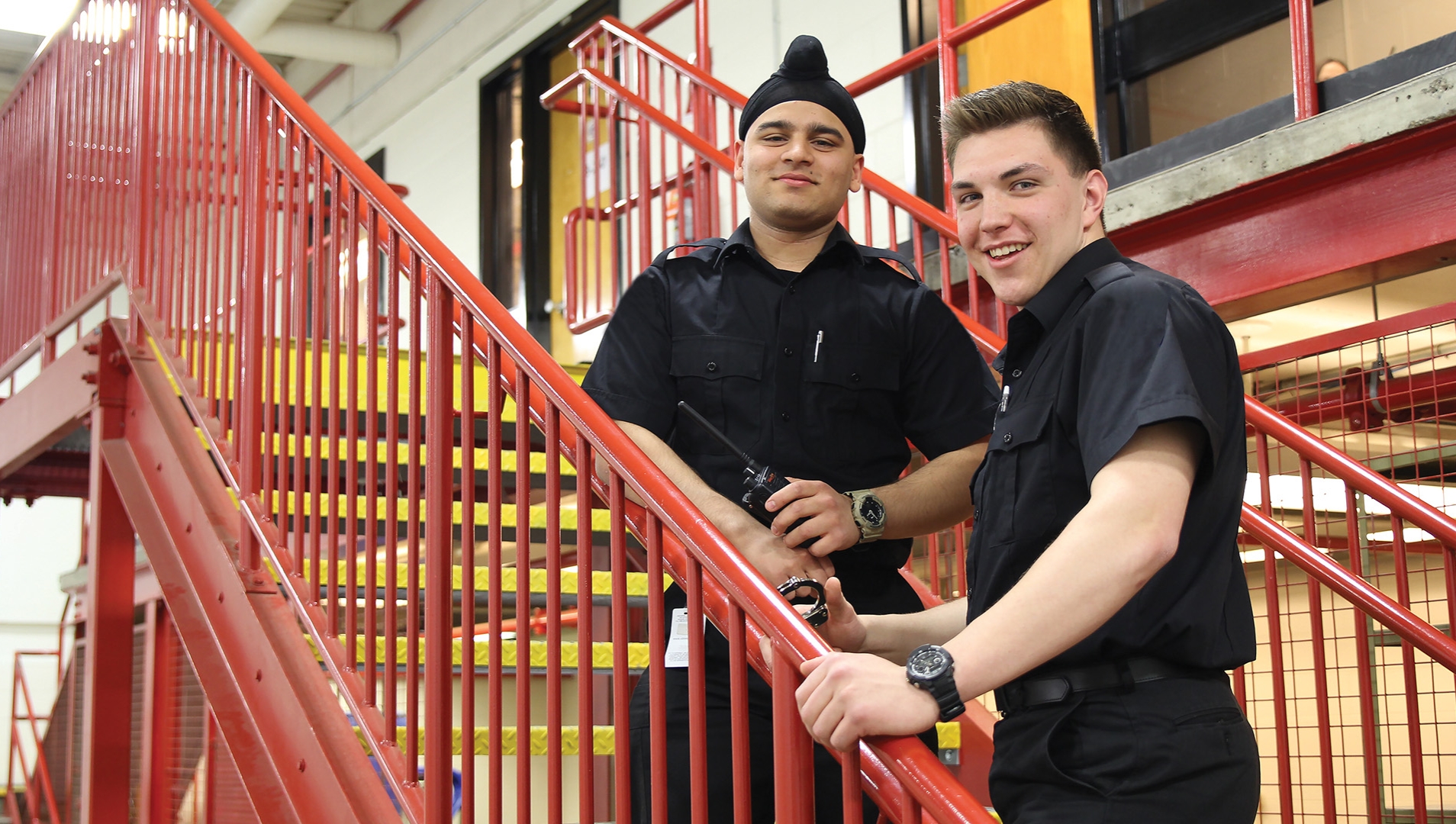Public Safety
Overview
Assiniboine’s eight-month Public Safety certificate program prepares students for a career in public safety agencies.
KEEP ME IN THE LOOP!
Fill out the form below to receive more information about our program and related events.
Program Learning Outcomes
- Work in compliance with established standards and relevant legislation in the protection, security and investigation fields.
- Make decisions in a timely, effective and legally defensible manner relating to safety and security.
- Carry out delegated duties and responsibilities in compliance with organizational policies and procedures.
- Act equitably and justly with diverse populations.
- Work effectively as a member of a team.
- Prevent and resolve crisis, conflict and emergency situations by applying effective techniques.
- Conduct and/or contribute to investigations by collecting, preserving and presenting admissible evidence.
- Observe, evaluate and accurately document behaviours, situations and events.
- Develop and implement ongoing effective strategies for personal and professional development.
Examples of what jobs graduates from this program can do:
This program prepares graduates for entry-level roles in the Sheriff’s department, corrections, security firms, risk management and loss prevention.
This program can also prepare graduates for policing roles within municipal and First Nation police services in Manitoba, or with other police services across Canada and is offered in partnership with the Brandon Police Service. However, the preferred pathway to policing careers is through Assiniboine’s eight-month Public Safety advanced diploma program which builds upon previous post-secondary education and prepares graduates to become a superior candidate in the highly competitive policing recruiting process.
Success Factors
You might be a good fit for this program if you are or have:
- A range of desirable personal and professional qualities for public safety, including integrity, empathy, strong communication skills, a high level of physical fitness, problem-solving skills, attention to detail, patience, and respect for diversity.
- Committed to public service and have a strong sense of responsibility to community.
- Interested in understanding the justice system and how it works.
- Keenly interested in a career in public safety.
The industry and program environment require individuals to:
- Be able to communicate effectively with people from all backgrounds, including those who may be in distress or under duress.
- Be able to think critically and solve problems quickly and effectively, often under high-pressure situations.
- Be willing to put themselves in harm's way to protect the public and uphold the law.
- Be honest, ethical, and trustworthy in all their actions and interactions.
- Be in good physical condition to perform their duties safely and effectively.
- Be patient and able to remain calm and composed in difficult situations.
- Be respectful of diversity and able to work effectively with people from different cultures, backgrounds, and lifestyles and demonstrate compassion and empathy in their interactions with individuals.
- Pay close attention to detail to ensure that they are following proper procedures and gathering accurate information.
Admissions
Admission Requirements
- A complete Manitoba Grade 12 or equivalent
- English 40G/40S or equivalent with a minimum mark of 60%
- Proof of current certification in emergency first aid, cardiopulmonary resuscitation (CPR)
Level C - Current criminal record vulnerable sector check
- Current child abuse registry check
- Current adult abuse registry check
- Valid driver’s license abstract
- Medical release
If you received your education outside of Manitoba, please review the equivalent admission requirements: Interprovincial or International. Applicants educated outside of Canada may be required to meet additional admission requirements.
This is a competitive entry program.
English is the language of instruction at Assiniboine. All applicants educated outside of Canada or in a country not on the test exempt list are expected to meet the English language proficiency requirements.
READY TO TAKE THE NEXT STEP IN YOUR EDUCATION JOURNEY?
Start your online application today and join Assiniboine College! Use the Public Safety program application checklist to help you collect your documents to ensure your application is complete prior to applying online.
DON'T MEET ADMISSION REQUIREMENTS?
If you don’t meet admission requirements, visit our Centre for Adult Learning to upgrade courses.
Elevate Your Public Safety Career to New Heights
Have you already laid the groundwork for your career in public safety with a diploma or degree and are now looking to elevate your expertise? Our Advanced Program is tailor-made for individuals like you. Aimed at deepening your knowledge and enhancing your skills, this program will prepare you for leadership roles and specialized positions within the field of public safety.
Competitive Entry Requirements
As an applicant, you will take part in a pre-entry interview, administered to determine your general suitability for the program. Applicants are ranked by the interview panel based on objective criteria, and the highest ranking applicants will be accepted. Interviews may be done using video conferencing software (e.g. Zoom).
This is a competitive entry program, so there may be additional pieces you need to complete in addition to the Admission requirements listed above. Early application is strongly recommended. Visit the competitive entry webpage.
Criminal Record/Abuse Registry Checks
Many agencies where students are placed for practicum experience require students to disclose convictions for any offenses. In some instances, applicants with a criminal record or listed on the Child Abuse Registry and/or Adult Abuse Registry may not be admitted to the program. If you fall into one of these categories, please contact the School of Health & Human Services prior to applying.
Careers & Connections
Career Opportunities
- Municipal, regional, provincial or Indigenous police services
- Canada Border Services Agency
- Sheriff’s office
- Correctional facilities
- Military Police with the Canadian Armed Forces
Connections
Assiniboine has a number of agreements with other colleges, universities and professional organizations, making it possible to apply credit taken at Assiniboine to programs at other institutions. For information on agreements, see Articulation Agreements.
Upon completion of this program, graduates will have the following certifications:
- Crime Prevention Through Environmental Design (CPTED) - through CPKN
- Traffic Investigation Level 1
- Non-violent Crisis Intervention (verbal only)
- RCMP DNA Collection
- Mental Health First Aid
- SafeTALK - through PMH
- Naloxone Nasal Spray Administration - through CPKN
- Centering Health, Respecting Rights: Policing in the Context of HIV and Hepatitis C - through CPKN
Tools & Supplies
Our classrooms, labs and shops are equipped with the necessary equipment that you need to make the most of your experience. However, there are some tools and supplies that you will need to purchase for personal use to help you with your studies.
Program Checklists, Textbooks, and Supplies
Program Checklists:
Textbooks:
Supplies:
ASSINIBOINE BOOKSTORE
Textbooks, supplies and uniforms may be purchased at the Assiniboine Bookstore at the Victoria Avenue East Campus. Booklists, tool lists and supply lists are available from your school office 30 days prior to the start date of your program.
Technology Requirements
Students in this program are required to bring their own laptop for use on-campus. The laptop must meet the technical needs outlined by the program. See Technology Requirements for detailed information.
Courses & Costs
Costs
Estimated Program Costs (Domestic students)
| Credits | 60.0 |
| Tuition | $3,720 |
| Course Fees | $1,530 |
| Students' Association fees (including Health Premium) | $580 |
| Estimated textbooks, tools, and supplies | $2,010 |
All fees are estimated and subject to change without notice.
For more information, visit the Fees and Charges page.
Courses
To graduate with a Public Safety certificate, students must successfully complete 60 academic credits. The minimum passing grade for each course is indicated on the course outline. Course offerings are subject to change and may vary by intake.
Courses
| Title | Credits/CEUs | Elective | Distance | PLAR |
|---|---|---|---|---|
Applied Training (JSTC-0022)Prerequisites: JSTC-0024 Criminal Law, JSTC-0021 Evidence/Documentation, JSTC-0027 Law Enforcement/Justice, COMM-0404 Cultural Diversity Comms |
6 credit(s) | No | No | No |
College Foundations (PEDV-0356)This course improves students' ability to navigate the college experience and environment, including student's rights, roles, and responsibilities. In this course, students reflect on their skills, attitudes, and expectations and develop learning strategies to help them to become successful, resilient, and self-directed learners. The course covers topics such as success in online learning, time management strategies, learning strategies, assessment taking strategies, academic integrity, information and digital literacy, and wellness, among others. It integrates elements of student orientation. |
0 credit(s) | No | No | No |
Community Policing (JSTC-0023)A police service and its officers must have a strong understanding of how they may best serve the communities in which they work. Students examine and apply community-based problem-solving models that utilize proactive approaches to reduce crime and promote community safety. |
6 credit(s) | No | No | No |
Criminal Law (JSTC-0024)Corequisite: JSTC-0026 Investigational Techniques |
6 credit(s) | No | No | No |
Cultural Diversity Comms (COMM-0404)In this course students explore and analyze the influences that shape culturally diverse communities. Students are exposed to various diverse and Indigenous cultures with a focus on Indigenous history from pre-contact to present day, including the relationship between Indigenous people and the Canadian justice system. Students learn to apply respectful intercultural communication theories in their daily and occupational lives. |
6 credit(s) | No | No | No |
Evidence/Documentation (JSTC-0021)Students learn the foundational building blocks of written communication required for writing clear and concise industry standard reports. Students learn the process required for evidence collection and forensic assessment and how to apply it to various situations and investigations. Students perform some of the skills employed by forensic identification officers and demonstrate the skills in scenario based situations. |
6 credit(s) | No | No | No |
Fitness/Deportment (JSTC-0025)Working in the field of Public Safety, officers are often placed into combative and stressful situations that require an exceptional level of physical and self-discipline. Health, nutrition, fitness and lifestyle choices greatly affect a public safety officer's success in these situations. Students obtain and maintain a required fitness level through aerobic and weight training. They also learn the importance of self-discipline, teamwork and professionalism through precision drill instruction. They learn how to care for and maintain their equipment and be properly dressed at all times while in uniform. Learners explore the impact of stress and lifestyle choices on physical and mental health. They learn how to manage these factors in order to realize a commitment to healthy living and maintain a high level of job performance. |
6 credit(s) | No | No | No |
Investigational Techniques (JSTC-0026)Corequisite: JSTC-0024 Criminal Law |
6 credit(s) | No | No | No |
Law Enforcement/Justice (JSTC-0027)As part of the Criminal Justice system, it is imperative that officers understand how court procedures affect their decisions in the performance of their duties. These procedures vary from issuing a provinical offence notice to compelling an accused to court and trial procedures and outcomes. Students employ the Criminal Code of Canada, the Charter of Rights and Freedoms, and case law to obtain a full understanding of these procedures. Students then explore many of the consolidated statutes of Manitoba. They learn to recognize the elements of an offence, enforcement requirements, court procedures, and a officer's legal authorities. |
6 credit(s) | No | No | No |
Operational Technology (COMP-0625)In this course, student move through three units containing 12 modules learning how to optimize time spent on their computers using current word processing and spreadsheet management software. They gain many technological skills, including radio procedures, messaging, researching, record management, word processing, data basing and global positioning. The theories covered in this course are common to most systems used by public safety organizations across Canada. |
6 credit(s) | No | No | No |
Policing Principles/Procedures (JSTC-0028)Prerequisites: JSTC-0024 Criminal Law, JSTC-0027 Law Enforcement/Justice |
6 credit(s) | No | No | No |
Frequently Asked Questions
How long does the recruitment process take?
For information regarding the recruitment process, please see the Public Safety checklist on our Competitive Entry webpage.
Can I apply if I have a previous conviction?
Minor convictions may be acceptable, however, every application is judged on its own merits. If you have any questions regarding previous convictions, guidance can be sought from the Chair of Public Safety. This applies to both the Criminal Record Check and Child Abuse Registry requirements.
What characteristics should an applicant have for the Public Safety program?
As a student, you must be willing and able to commit to academic study and physical training. Like police officers, students must be able to work effectively in a team environment yet able to exercise initiative, give and respond to instructions. If you want to work in the public safety field, you need to be an effective communicator, able to relate to others and show sympathy and tact as necessary.
You must be disciplined, prepared for shift work, honest, mature and socially aware. Those who work in public safety fields must be able to take control of critical situations by weighing out the process and deciding on an appropriate course of action. They must be prepared for becoming involved in physical danger that may be life-threatening.
What is the process for getting accepted into the program?
Details on the admissions process are available under the 'Admissions' tab of this program webpage. A checklist is available on our Competitive Entry webpage and will help you to ensure you have everything needed for a complete application.
Applicants for this program must undergo a selection interview that is based on situational and behavioural experiences. Only top candidates in the interview process are accepted into the program.
Do I require any special clothing or equipment for Public Safety?
Public Safety students require a special uniform with drill shoes, gym/workout clothing and jacket. A complete clothing list will be provided once you are accepted into the program.
Am I required to have any specific immunizations for the Public Safety program?
No.
What other things will I need to have to be successful in the Public Safety program?
You will need to be able to complete intense physical training for this program, manage the academic requirements and participate in teamwork activities. This program is tough and challenging, so discipline is essential to ensure that you meet the requirements of program completion.
When is the next program information session?
Program information sessions are completely free to attend, and we invite you to bring a guest along as well. It's a good idea to register in advance so we know you're coming.
To find the complete schedule for our program information sessions and to RSVP, visit the program information session page.




